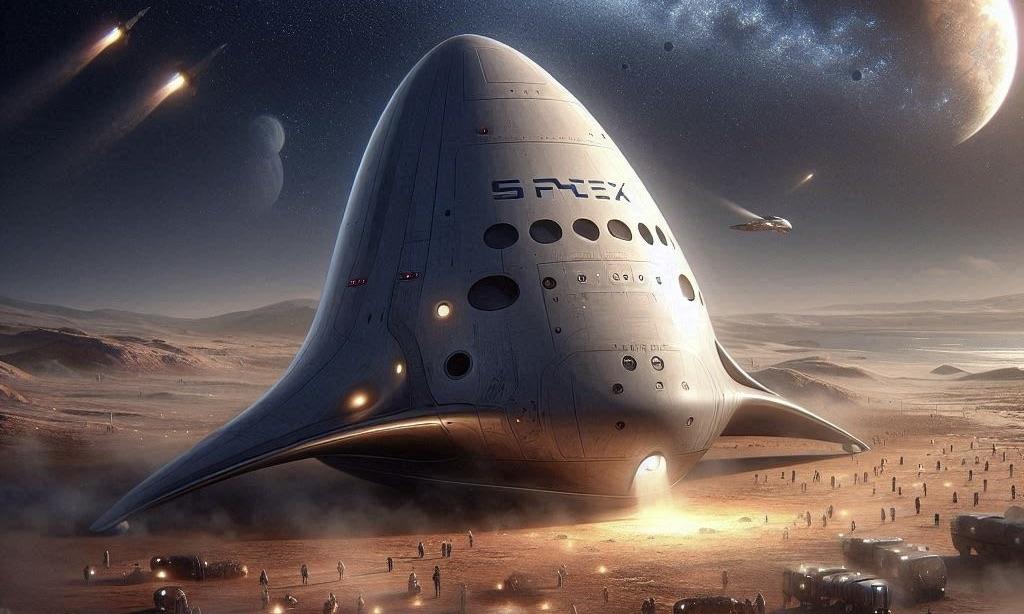Elon Musk has revealed that SpaceX’s Starship will launch its first uncrewed mission to Mars in 2026. This historic flight will test the rocket's ability to land on the red planet, and crewed missions are planned for 2028. This marks a significant step toward making life interplanetary.
SpaceX Starship’s First Mars Mission Set for 2026, Crewed Flights Expected by 2028
In a significant revelation, Elon Musk recently disclosed the date of SpaceX's inaugural Starship mission to Mars.
After a year of rigorous flight tests, SpaceX is on the brink of a breakthrough with its mega-rocket, Starship. If successful, this engineering marvel will transport humans to Mars and revolutionize interplanetary life.
Musk has ambitious intentions for Starship, as evidenced by his announcement of the rocket's ambitious timeline for Mars missions. Initially, the missions will be unplanned:
“The first Starships to Mars will launch in 2 years when the next Earth-Mars transfer window opens. These will be uncrewed to test the reliability of landing intact on Mars. If those landings go well, then the first crewed flights to Mars will be in 4 years.”
The Starship's maiden voyage to Mars is slated for 2026, with crewed missions following in 2028. Whether these brave astronauts will set foot on Martian soil remains unanswered, adding a layer of suspense and anticipation to this epic journey. The audience is left eagerly awaiting further updates on this historic mission.
Musk Envisions Frequent Mars Voyages, Paving the Way for a Multi-Planetary Future with Starship
Musk subsequently stated that the frequency of these voyages from Earth to Mars using Starship will “grow exponentially from there.” According to Teslarati, this optimistic projection suggests a bright future for space exploration and the potential for Mars to become an autonomous city approximately 20 years later. It leaves the audience feeling hopeful and excited about the possibilities of a multi-planetary future.
Musk continued, stating:
In his continued vision, Elon Musk emphasized the profound impact of being multi-planetary. He stated, “Being multi-planetary will vastly increase the probable lifespan of consciousness, as we will no longer have all our eggs, literally and metabolically, on one planet.” This thought-provoking statement invites us to contemplate the potential evolution of human consciousness in a multi-planetary future.
Despite SpaceX's significant progress, the Federal Aviation Administration (FAA) has yet to grant clearance for the Starship launch. This is a crucial step, as the FAA is the ultimate authority to grant permission, even though the Federal Communications Commission (FCC) has certified the flight.



 Ford and Geely Explore Strategic Manufacturing Partnership in Europe
Ford and Geely Explore Strategic Manufacturing Partnership in Europe  NASA Resumes Cygnus XL Cargo Docking with Space Station After Software Fix
NASA Resumes Cygnus XL Cargo Docking with Space Station After Software Fix  Trump and Merck KGaA Partner to Slash IVF Drug Costs and Expand Fertility Coverage
Trump and Merck KGaA Partner to Slash IVF Drug Costs and Expand Fertility Coverage  Alphabet’s Massive AI Spending Surge Signals Confidence in Google’s Growth Engine
Alphabet’s Massive AI Spending Surge Signals Confidence in Google’s Growth Engine  SpaceX Reports $8 Billion Profit as IPO Plans and Starlink Growth Fuel Valuation Buzz
SpaceX Reports $8 Billion Profit as IPO Plans and Starlink Growth Fuel Valuation Buzz  SpaceX Updates Starlink Privacy Policy to Allow AI Training as xAI Merger Talks and IPO Loom
SpaceX Updates Starlink Privacy Policy to Allow AI Training as xAI Merger Talks and IPO Loom  Blue Origin’s New Glenn Achieves Breakthrough Success With First NASA Mission
Blue Origin’s New Glenn Achieves Breakthrough Success With First NASA Mission  Anthropic Eyes $350 Billion Valuation as AI Funding and Share Sale Accelerate
Anthropic Eyes $350 Billion Valuation as AI Funding and Share Sale Accelerate  Baidu Approves $5 Billion Share Buyback and Plans First-Ever Dividend in 2026
Baidu Approves $5 Billion Share Buyback and Plans First-Ever Dividend in 2026  Sony Q3 Profit Jumps on Gaming and Image Sensors, Full-Year Outlook Raised
Sony Q3 Profit Jumps on Gaming and Image Sensors, Full-Year Outlook Raised  Amazon Stock Rebounds After Earnings as $200B Capex Plan Sparks AI Spending Debate
Amazon Stock Rebounds After Earnings as $200B Capex Plan Sparks AI Spending Debate  Prudential Financial Reports Higher Q4 Profit on Strong Underwriting and Investment Gains
Prudential Financial Reports Higher Q4 Profit on Strong Underwriting and Investment Gains  Elon Musk’s Empire: SpaceX, Tesla, and xAI Merger Talks Spark Investor Debate
Elon Musk’s Empire: SpaceX, Tesla, and xAI Merger Talks Spark Investor Debate  FDA Adds Fatal Risk Warning to J&J and Legend Biotech’s Carvykti Cancer Therapy
FDA Adds Fatal Risk Warning to J&J and Legend Biotech’s Carvykti Cancer Therapy  Australian Scandium Project Backed by Richard Friedland Poised to Support U.S. Critical Minerals Stockpile
Australian Scandium Project Backed by Richard Friedland Poised to Support U.S. Critical Minerals Stockpile  OpenAI Expands Enterprise AI Strategy With Major Hiring Push Ahead of New Business Offering
OpenAI Expands Enterprise AI Strategy With Major Hiring Push Ahead of New Business Offering 





























